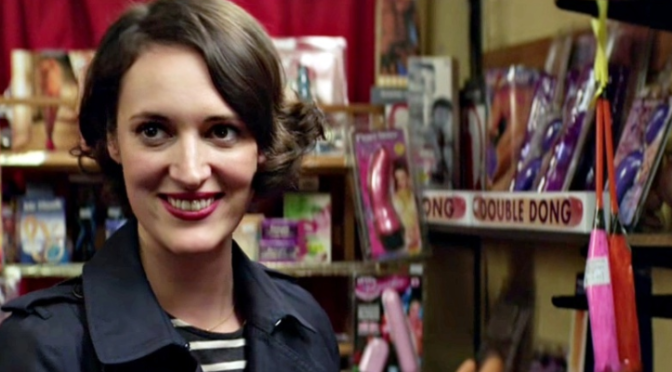The eponymous character in Fleabag (played by Phoebe Waller-Bridge) speaks to the self-loathing, insecure piece of shit masquerading as someone who doesn’t care inside all of us. Created from a stand-up night challenge proposed by one of Waller-Bridge’s friends, the ten-minute sketch became a one-woman play in 2013 performed in Edinburgh. In its TV series form, Waller-Bridge is given further opportunity to leave no uncomfortable and accurate stone unturned.
Hungry for sex and validation on a constant basis, Fleabag’s story begins with her signature breaking the fourth wall move (which is, quite frankly, what Sex and the City should have maintained from its first season) and explaining how she’s just pretended not to spend hours getting ready for an attractive bartender (Ben Aldridge) to come to her apartment and ultimately fuck her up the arse because she’s drunk and “he came all this way.” This is also right around the time she meets a toothy guy on the bus referred to as Bus Rodent (Jamie Demetriou), who asks for her number after she explains about her recent breakup with Harry (Hugh Skinner), her doting, nice guy boyfriend who always gets back together with her after every slight. The latest reason for their separation is explained through Fleabag’s flashback to masturbating to Obama on her laptop while assuming Harry was asleep. Indeed, her constant preference for masturbation is a major source of contention between them. It’s just, you know, as she says, Harry only wants to “make love” to her–and where’s the arousal in that?
In any case, upon consenting to give Bus Rodent her info, she makes a beeline for the bank, where she unsuccessfully attempts to get a loan for her small business–a fledgling cafe with a guinea pig theme–after getting so hot from running that she tries to take her sweater off, thinking there’s something underneath it other than her bra. The Bank Manager (Hugh Dennis) immediately rebuffs her application, as the bank has just evaded a sexual harassment scandal.
The interspersed memories of her former business partner and friend, Boo (Jenny Rainsford), escalate throughout the series, with the explanation for her death being revealed over time, and as part of the denouement of episode six. However, the gist of it, as Fleabag tells her unsuspecting cab driver on the way back from stealing a valuable sculpture from her Godmother (Olivia Colman), now married to her Dad (Bill Paterson) in the wake of her mother’s death from breast cancer, is this: Boo found out her boyfriend was sleeping with someone else and wanted to make him apologize by lightly getting run over by a bike, in an attempt to make it seem to him as though she was truly suicidal. The plan backfired and the bike that hit her flung her out into the street to smack into a car, killing a total of three people, herself included.
And so, Fleabag remains forever haunted by thoughts of Boo as she manages the often empty cafe alone while looking after the guinea pig she had bought her as a present. Save for the occasional non-paying patron who uses the space as a charging station for his phone and computer, Fleabag mostly hangs out alone, with ample time to take pictures of her vag to send to various men in her phone, hoping for someone to respond and ask her out for the night. In between trolling for seed and refusing to ask her older, more financially and domestically stable sister, Claire (Sian Clifford), for a loan to keep the cafe afloat, Fleabag also goes to feminist lectures and retreats–paid for by her guilt-ridden but emotionally bereft father as a consolation for her mother’s absence–with Claire. Nonetheless, as she confesses to her father that she has the more than sneaking suspicion that she’s “a greedy, perverted, selfish, apathetic, cynical, depraved, morally bankrupt woman who can’t even call herself a feminist,” it’s evident she doesn’t want to acknowledge too much of anything to herself, least of all reality.
Not knowing what to do with this, her father simply calls her a taxi. It is reactions like this to Fleabag’s occasional outpourings and admissions to having a soul that brings the most overt tinge of sadness to the narrative. After all, when you finally take the risk in opening up to another human being only to find that it’s just as you suspected and no one gives a fuck, how can you do anything but go back to being a soulless automaton like everyone else? It’s the unspoken rule for survival in the modern era.






















